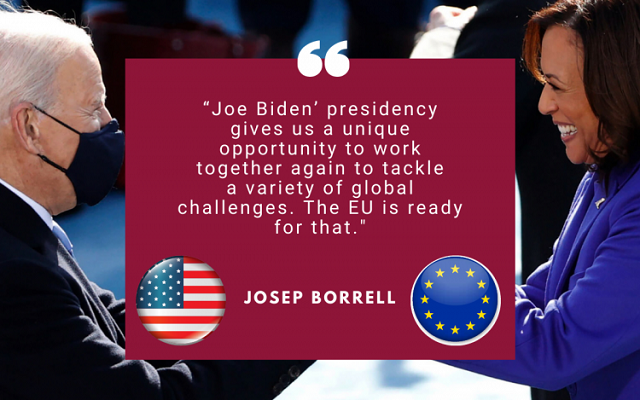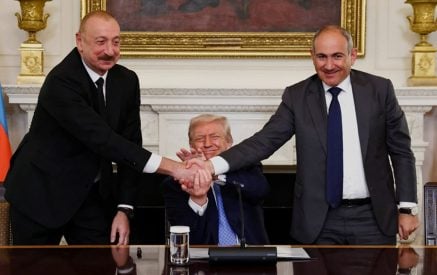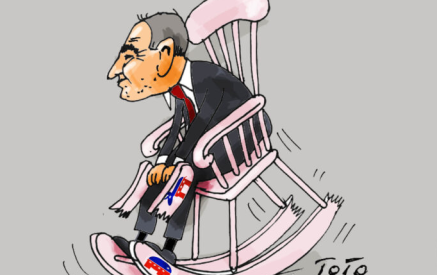From the blog by EU High Representative Josep Borrell – The inauguration of Joe Biden opens a welcome new chapter in EU-US relations. As President Biden has signalled, there is much to repair and rebuild, both at home and abroad. But this is above all a moment of opportunity. We as EU are ready to revive our partnership, which is so important at a time of tumultuous global change.
Like millions of people around the world, I followed President Biden’s inaugural address. Naturally, the President focused his speech principally on how to heal a divided nation, how to bring Americans back together and cope with the pandemic crisis by building back better. However, looking beyond America, he also announced that the US will “lead, not merely by the example of our power, but by the power of our example” and vowed to “repair our alliances and engage with the world once again”.
“The transatlantic partnership has shaped international relations and global order more than any other relationship. It is our most strategic relationship.”
The EU is ready for that: we have a unique opportunity to work together again to tackle a variety of global challenges. Even during the turbulence and challenges of the Trump administration, the truth remained: the transatlantic partnership, which more than any other relationship has shaped international relations and global order. It is our most strategic relationship, being not only indispensable for security and prosperity in the transatlantic area, but also to sustain a world order anchored in democracy, the rule of law and multilateralism.
‘Making multilateralism great again’
The President underlined that the US will “be a strong and trusted partner for peace, progress and security”. Europe wants it closest partner back at the world’s table. The EU and US must pull in the same direction when it comes to resolving the growing number of conflicts and geopolitical tensions, to define common standards and norms for the 21st century, and to work on shaping and strengthening the multilateral system. I look forward to work with State Secretary Blinken, who has also already vowed a new era of international cooperation. Let’s work together in making multilateralism great again.
Read also
A reinforced transatlantic partnership is key for global change
Together with the European Commission, I put forward a comprehensive “EU-US agenda for global change”, which spans four broad areas: green leadership, the COVID-19 response and global health, trade and technology, and global action and security.
“The world needs American and European leadership in the battle against the COVID-19 pandemic and shaping the global recovery.”
In the coming weeks and months, the focus on both sides of the Atlantic will be on tackling the COVID-19 pandemic and ensuring a solid pathway to global recovery. The world needs American and European leadership in this battle and I am very happy that President Biden has already signed an executive order reversing the decision to leave the World Health Organization. We look forward to work with the new administration on fighting the pandemic and shaping the recovery. At all levels: be it government to government, but also business, civil society, and scientists. It is already underway: the first vaccine used in the US and the EU is a “transatlantic product”, developed by a joint venture between a German and a US company.
We can all see how the pandemic and the related economic downturn also provide a perfect breeding ground for populism, radical ideas, and consequently divisions and social unrest. The assault on 6 January storm on the Capitol was a wake-up call for all democracy advocates around the world. Indeed, as President Biden said, “we have learned again that democracy is precious, democracy is fragile”. We must fight disinformation and inequalities and ensure that our democratic narrative prevails. It is urgent that both the EU and the US take concrete steps to stem the rise in authoritarianism, corruption and human rights abuses.
US re-joining the Paris Agreement and addressing the climate crisis
The decision of President Biden to re-join the Paris climate agreement is fundamental, and working together on the climate crisis and to cooperate again in the global fight against climate change is at the forefront of our agenda.
“The decision of President Biden to re-join the Paris climate agreement is fundamental.”
The EU proposes to establish a comprehensive transatlantic ‘green agenda’, to mobilise more ambitious global climate action, starting with a joint commitment to net-zero emissions by 2050. For this, we need in particular to work on measures to build a green technology alliance; phase out fossil fuels; avoid carbon leakage; develop a global regulatory framework for sustainable finance; help poorer countries to adapt to climate change and pursue a joint leadership in the fight against deforestation. We have much to do together and we have no time to waste.
The global order, peace and security
There can be no doubt that the US plays an essential role in the maintenance of peace and security, and also in European security. Indeed, in many places on our continent and at our borders, we need to work together to get sustainable results, from the Western Balkans, to the Eastern Mediterranean to Ukraine and beyond. As global partners, we will have to deepen our dialogue and cooperation in all areas, including on reviving the Iran nuclear deal and the broader area of non-proliferation and arms control. In addition, we will soon begin a dialogue to discuss the full range of issues related to China. We will also look at opportunities for cooperation across the globe where our interests coincide.
“A strong and capable Europe is not a rival to the trans-Atlantic alliance but a precondition for it.”
Many US administrations have insisted that Europe increases its defence efforts to take better care of its own security and act as a security provider. So it matters that we are already actively working to strengthen EU defence policies, capacities and operations. Our flagship defence initiatives now include the Permanent Structured Cooperation (PESCO), the European Defence Fund (EDF) and military mobility. Indeed, a strong and capable Europe is not a rival to the trans-Atlantic alliance but a precondition for it.
Reinforcing defence capabilities of EU member states strengthen the Alliance and contribute to transatlantic burden-sharing. A more assertive, more capable and resilient Europe is the best partner for the US. Enhancing Europe’s security role will allow for a better cooperation with the US when it comes to the security risks of today and those of the future. It is clear that we have much to gain from close cooperation with the US to address pressing security challenges, from cyber security to hybrid threats, protecting our critical infrastructure and the security implications of climate change. We should certainly be ambitious in this area.
While we step up cooperation, we should be mindful that the experience of the last four year have left their toll on European public opinion. Indeed a clear majority of Europeans, as explained in a recent ECFR report(link is external), now believe that even under President Biden, the US will be mostly consumed with healing internal divisions and will have little capacity or will to help solve global problems. And there are underlying reasons—demographic, economic, and political—why the historical trajectory of the United States and Europe could well diverge. However, we appreciate that at least for the next four years there will be a US President who believes in partnership with democratic allies. And we don’t just feel appreciation for this restoration, but we recognize its necessity.
Working together on technology, trade and standards
Technology issues are now part of foreign policy. That’s why the rapid technological change in front of us gives us a window of opportunity to develop a joint EU-US strategic ‘high tech agenda’. We want to cooperate on devising clear rules and their enforcement on the responsibility of online platforms and Big Tech, work together on fair taxation and market distortions, and develop a common normative approach to the future development of key technologies. Let us in the ‘tech democracies’ provide a response to these challenges before it is too late.
In sum, the list of challenges we face is long. And sometimes differences in views between us will persist. That is normal. However, with Biden, the tone and basic posture is changing. In diplomacy, that matters a lot. C’est le ton qui fait la musique, as they say in French. Let’s get to work and rebuild our alliance for democracy, prosperity, global security and a better and more stable world.
European Union



























































